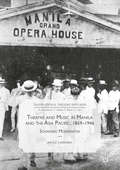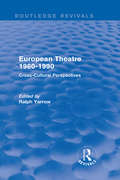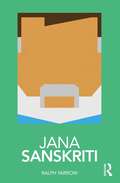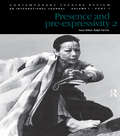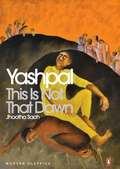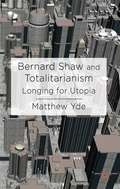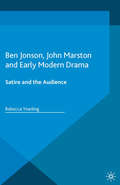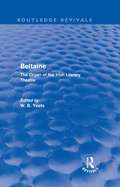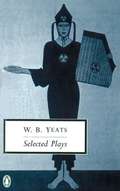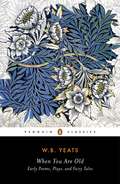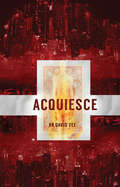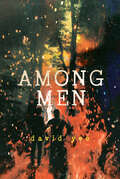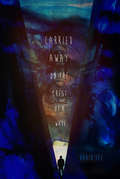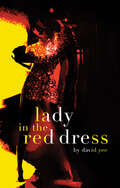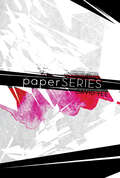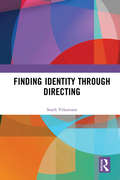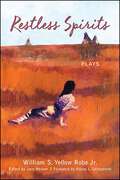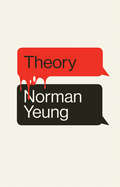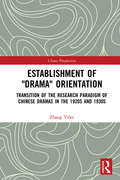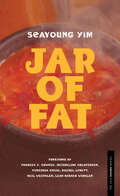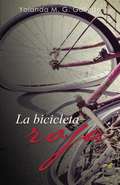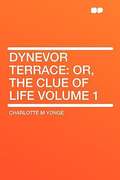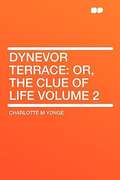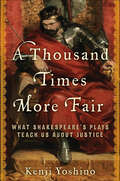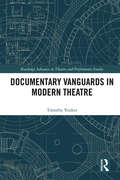- Table View
- List View
Theatre and Music in Manila and the Asia Pacific, 1869-1946: Sounding Modernities (Transnational Theatre Histories)
by MeLê YamomoThis book examines the intersection between sound and modernity in dramatic and musical performance in Manila and the Asia-Pacific between 1869 and 1948. During this period, tolerant political regimes resulted in the globalization of capitalist relations and the improvement of transcontinental travel and worldwide communication. This allowed modern modes of theatre and music consumption to instigate the uniformization of cultural products and processes, while simultaneously fragmenting societies into distinct identities, institutions, and nascent nation-states.Taking the performing bodies of migrant musicians as the locus of sound, this book argues that the global movement of acoustic modernities was replicated and diversified through its multiple subjectivities within empire, nation, and individual agencies. It traces the arrival of European travelling music and theatre companies in Asia which re-casted listening into an act of modern cultural consumption, and follows the migration of Manila musicians as they engaged in the modernization project of the neighboring Asian cities.
European Theatre 1960-1990: Cross-Cultural Perspectives (Routledge Revivals)
by Ralph YarrowEuropean theatre has been the site of enormous change and struggle since 1960. There have been radical shifts in the nature and understanding of performance, fuelled by increasing cross-cultural and international influence. Theatre has had to fight for its very existence, adapting its methods of operation to survive. European Theatre 1960-1990, first published in 1992, tells that story. The contributors - who in many cases have been theatre practitioners as well as critics - provide a wealth of fascinating information, covering Germany, France, Poland, Italy, Spain and Sweden, as well as Britain. The book offers an historical and descriptive overview of developments across national boundaries, enabling the reader to compare and contrast acting and directing styles, administrative strategies and the relationship between ideology and achievement. Chapters trace the evolution of theatre in all its aspects, including such elements as the end of censorship in many countries, the upsurge in political and personal awareness of the 1960s, shifting patterns of state artistic policy, and the effects on companies, directors, performers and audiences. This book should be of interest to undergraduates, postgraduates and academics of theatre studies.
Jana Sanskriti (Routledge Performance Practitioners #24)
by Ralph YarrowRegarded by Augusto Boal as the international icon of his vision, Jana Sanskriti are the leading practitioners of Theatre of the Oppressed and Forum Theatre in India and the East. The group has worked continuously with rural communities in West Bengal since its beginnings in 1985 to reconfigure social and political relationships through theatre, achieving both a solid regional presence and an international reputation. This book combines: a biography of the group, charting their history, methodology and modes of operation an examination of Jana Sanskriti through the writings of their founder, Sanjoy Ganguly a detailed analysis of their performance events and practices, including the plays collected in Ganguly's Where We Stand (2009) practical exercises and games, taken from Jana Sanskriti's workshops and festivals. As a first step towards critical understanding, and as an initial exploration before going on to further, primary research, Routledge Performance Practitioners offer unbeatable value for today’s student.
Presence and Pre-Expressivity 2
by Ralph YarrowThis is Volume 7, Part I of the Contemporary Theatre Review, an International Journal, with this edition focusing on Prescence and pre-expressivity. Covering topics such as Body in Mind: Exploring Pre-Expressivity; Peter Brook and Traditional Thought; Grotowski, Holiness, and the Pre-Expressive; Barba's Concepts of the Pre-Expressive and the Third Organ of the Body of the Theatre and Theories of Consciousness; Pre-Expressivity: Some Thoughts from the Rehearsal Floor.
This Is Not That Dawn Jhootha Sach
by Yashpal Translated from the Hindi AnandJhootha Sach is arguably the most outstanding piece of Hindi literature written about the Partition. Reviving life in Lahore as it was before 1947, the book opens on a nostalgic note, with vivid descriptions of the people that lived in the city’s streets and lanes like Bhola Pandhe Ki Gali. Tara, who wanted an education above marriage; Puri, whose ideology and principles often came in the way of his impoverished circumstances; Asad, who was ready to sacrifice his love for the sake of communal harmony. Their lives—and those of other memorable characters—are forever altered as the carnage that ensues on the eve of Independence shatters the beauty and peace of the land, killing millions of Hindus and Muslims, and forcing others to leave their homes forever. Published in English translation for the first time, Yashpal’s controversial novel is a politically charged, powerful tale of human suffering.
Bernard Shaw and Totalitarianism Longing for Utopia
by Matthew YdeThis book reveals the genuity of Shaw's totalitarianism by looking at his material - articles, speeches, letters, etc but is especially concerned with analyzing the utopian desire that runs through so many of Shaw's plays; looking at his political and eugenic utopianism as expressed in his drama and comparing this to his political totalitarianism.
Ben Jonson, John Marston and Early Modern Drama: Satire and the Audience
by Rebecca YearlingThis book examines the influence of John Marston, typically seen as a minor figure among early modern dramatists, on his colleague Ben Jonson. While Marston is usually famed more for his very public rivalry with Jonson than for the quality of his plays, this book argues that such a view of Marston seriously underestimates his importance to the theatre of his time. In it, the author contends that Marston's plays represent an experiment in a new kind of satiric drama, with origins in the humanist tradition of serio ludere. His works—deliberately unpredictable, inconsistent and metatheatrical—subvert theatrical conventions and provide confusingly multiple perspectives on the action, forcing their spectators to engage actively with the drama and the moral dilemmas that it presents. The book argues that Marston's work thus anticipates and perhaps influenced the mid-period work of Ben Jonson, in plays such as Sejanus, Volpone and The Alchemist.
Beltaine: The Organ of the Irish Literary Theatre (Routledge Revivals)
by W. B. YeatsFirst published in 1970, this book is a faithful representation of the original edition of Beltaine, a literary magazine edited by W. B. Yeats from May 1899 to April 1900. Beltaine was the first of several magazines of the Irish Literary Theatre (later to become The Abbey Theatre) in which Yeats’s editorial role was of utmost importance. It was an occasional publication and focused on promoting current works of Irish playwrights whilst challenging those of their English opponents. The magazine mainly consists of a series of essays on the theatre in Dublin, and supplementing these are explanations and discussions of new plays, excerpts from which are often included. This book will be of interest to those with an interest in Yeats, early nineteenth-century literature, and Irish theatre.
Selected Plays (Penguin Modern Classics)
by William YeatsThe 18 plays are: The Shadowy Waters; Cathleen in Houlihan; The Hour Glass; On Baile's Strabd; The Green Helmet; Deirdre; At the Hawk's Well; The Dreaming of the Bones; The Cat and the Moon; The Only Jealousy of Emer; Calvary; Sophocles' King Oedipus; The Resurrection; The Words Upon the Windwo-FPane; The King of the Great Clock Tower; The herne's Egg; Purgatory; The Death of Cuchulain.
When You Are Old: Early Poems, Plays, and Fairy Tales
by William Butler Yeats Rob DoggettRecalling Yeats's 1890s fascination in aestheticism and the arts and crafts movement, selections will draw from the first published versions of poems from works such as Crossways, The Rose, The Wind Among the Reeds, In the Seven Woods, The Green Helmet and Other Poems, Responsibilities, The Wild Swans at Coole, and Michael Robartes and the Dancer. A selection Irish myths and fairytales including "The Wanderings of Oisin," a Celtic fable and his first major poem, represent his fascination with mysticism, spiritualism and the rich and imaginative heritage of his native land.
acquiesce
by David YeePlagued by the success of his first book and haunted by his past, Sin Hwang arrives in Hong Kong with some unusual cargo and a lot of emotional baggage. Featuring a surreal cast of characters, from a foul-mouthed Paddington Bear to a wisecracking Buddhist monk, this sharply comedic and heartbreakingly poignant tale of self, familial, and spiritual discovery reflects the cycles from which we must all break free as we find our way.
among men
by David YeeDavid was inspired to write this after reading Al Purdy’s poem “House Guest,” the only poem that really records this period of Al Purdy and Milton Acorn’s lives.First produced by Factory Theatre, Toronto, in April 2022
carried away on the crest of a wave
by David YeeFrom the shore of Ko Phi Phi in Thailand to a suburb in Utah to a mysterious Kafkaesque hole in the ground, carried away on the crest of a wave gives us brief glimpses into the lives of a sphinx-like escort, a grieving father, a conflicted priest, brothers of legend, a felonious housewife, an accountant of time, an orphaned boy, a radio shock jock and a man who finds things. Each are connected, primarily, by the cataclysmic 2004 Indian Ocean tsunami that claimed the lives of over a quarter million people. In a series of vignettes, carried away on the crest of a wave illustrates the ripple effect of one of the deadliest natural disasters in recorded history and ponders what happens when the events that bind us together are the same events that tear us apart.
lady in the red dress
by David YeeThe turmoil in Max's life was set in motion by Sylvia, an elusive figure who enters his life and charges Max with the task of finding Tommy Jade, a Chinese immigrant from the 1920s. Dragged further into the history of the Chinese-Canadian struggle for redress and into the lives of those involved, Max discovers that not only is his life in danger, but also his son's. A modern-day noir that draws from both Haruki Murakami and Frank Miller, lady in the red dress is a darkly comic story about the skeletons in our closets and the consequences of our inactions told by one of Canada's most-promising young playwrights.
paper SERIES
by David YeeAn unhappy orphan who finds solace in paper cut-outs of her parents, an Indian doctor who displays his medical degree in his taxi cab, and waiters who tamper with fortune cookie are some of the vibrant characters who are brought to life in this anthology of six monologues that revolve around paper. From drama to comedy to crime-thriller, Yee brings us a variety of plots and characters in a series of imaginative, thought-provoking vignettes.
Finding Identity Through Directing
by Soseh YekaniansFinding Identity through Directing is a practice-led autoethnographical monograph that provides an in-depth exploration into the field of theatre directing and an individual’s endless creative pursuit for belonging. The book specifically examines how a culturally displaced individual may find a sense of identity through their directing and addresses the internal struggles of belonging, acceptance and Self that are often experienced by those who have confronted cultural unhoming. The first half of the story scrutinises Dr Yekanians’ own identity as an Iranian born Armenian-Australian and how she struggled with belonging growing up in a world that for the most part, was unaccepting of her differences. The second half, looks at how theatre directing, aided her (re)discovery of Self. While evidence shows that within the past decade there has been a growing interest in the vocation of theatre directing, embarking on a career within this field, while exciting, can often be a daunting and experimental vocation. Finding Identity through Directing questions this conundrum and specifically asks, in a competitive artistic profession that is rapidly developing, what attracts an individual to the authoritative role of the director and what are the underlying motivations of this attraction? By uncovering that there is more to the role of the director than the mere finality of a production, we can observe that the theatre is a promising setting for cultural exchanges in dialogue and for personal development. Theatre directing as the vehicle for these expansions and progressions of self can potentially address the internal struggles of identity often experienced by those who, in some form, have encountered cultural displacement.
Restless Spirits: Plays (Excelsior Editions)
by William S. Yellow RobeFinalist for the 2020 ForeWord INDIE Book of the Year in the Multicultural Adult Fiction Category Restless Spirits is a collection of previously unpublished plays by contemporary Assiniboine playwright William S. Yellow Robe Jr. Including one full-length and seven one-act plays, this book reflects one of the author's most creative and productive periods in his career. Selected by Yellow Robe, in consultation with editor Jace Weaver, the plays reveal the range of Yellow Robe's writing from tragedies to farce. They are unified by their supernatural themes or significant elements, including Wood Bones, his most recent and highly successful full-length play. Weaver's introduction says that the works in this collection clearly demonstrate that Yellow Robe is not just a great American Indian playwright, but a great American playwright in the company of David Mamet, Lynn Nottage, and Wallace Shawn. Renowned American Indian playwright Hanay L. Geiogamah provides a foreword and calls this volume "a real gift to the American Indian theater—and to theater, more generally."
Theory
by Norman YeungIs there a limit to free speech? Who gets to decide? Isabelle’s film theory students are stunned that she would open an unmoderated online discussion group to complement a controversial syllabus. Her intention was for them to learn from each other, but when an anonymous student starts to post racist comments and offensive videos on the forum and others challenge Isabelle’s methods, she is forced to decide whether to intervene or to let the social experiment play out. But the posts soon turn abusive and threatening to Isabelle’s relationship with her wife, Lee, causing her to take matters into her own hands. In this thrilling exploration of the intersections and divisions within liberalism, a young tenure-track professor finds herself in a high-stakes game of cat-and-mouse that has her questioning her beliefs and fighting back for her life.
Establishment of "Drama" Orientation: Transition of the Research Paradigm of Chinese Dramas in the 1920s and 1930s (China Perspectives)
by Zhang YifanThe “national drama” in China is a historical concept. Grown on longstanding Chinese culture and art, the traditional drama, mainly in the form of “opera”, has been integrated with “drama” of an international background. From the perspective of modern “drama and opera”, this book mainly studies the conditions and research of Chinese traditional drama in the 1920s and 1930s. Instead of analyzing from the viewpoint of literature appreciation or music theory, the author regards the drama as a comprehensive stage art. He attaches special importance to restoring historical scenes and therefore mainly introduces the drama journals and monographs published in that historical period, in order to help readers understand the original state of drama at that time through the records of the witnesses. In particular, this book delivers an insightful view about the evolution of the meaning of “national drama” and “drama”. The book will help scholars and readers understand the meaning and the whole story of the “national drama” concept, and will certainly facilitate the construction of the discipline of Drama and Opera.
Jar of Fat (Yale Drama Series)
by Seayoung YimAn absurdist comedy and fifteenth winner of the Yale Drama Prize, exploring family, religion, identity, desire, and beauty in Korean American culture In a fantastical fairy-tale world, two Korean American sisters are deemed too fat to fit in their family grave. Will the sisters’ close bond survive under the pressure of their community and fretful parents, who will spare no effort to make them tinier? Jar of Fat, the fifteenth winner of the Yale Drama Prize, is a phantasmagorical, absurdist Korean American tale about the allure and danger entangled within the quest for beauty and thinness. Both laugh-out-loud funny and deeply troubling, Seayoung Yim’s play burns through the accumulated rage that anti-fat bias produces to reclaim what it steals from us every day: grace, space, possibility, and breath.
La bicicleta roja
by Yolanda María González GallegoLas personas en las que confiamos son siempre las que guardan los secretos más atroces. Meli lleva a tres de sus amigos a conocer el almacén que, una vez derribado y reconstruido, albergará el restaurante de su novio. <P><P> Sin embargo, lo que se presentaba como una tarde tranquila y relajada se convierte en un auténtico infierno cuando alguien encierra al grupo dentro del almacén. Por si fuera poco, el derribo del local tendrá lugar a la mañana siguiente. <P>El pánico ante esta situación extrema hará que los amigos acaben por desvelar secretos que habían mantenido ocultos durante mucho tiempo. Accésit en el I Certamen Textos Teatrales "Escena Canaria"
Dynevor Terrace; Or, The Clue of Life -- Volume 1
by Charlotte M. YongeDynevor Terrace may be described as an extended family chronicle. All the main characters and many of the minor characters are either descendants of the Dynevors, an ancient Welsh family, or closely connected with them. The line had ended with three daughters, who all married in the 1 790s. In 1847, when the novel opens, only the eldest sister is still alive. Catherine has had a chequered life. Born the heiress of Cheveleigh, the family seat, she had married a Mr Frost who speculated in mines. At first his ventures were successful, and he invested some of the proceeds in Dynevor Terrace, built for letting in the small spa town of Northworld, near the seat of the earl of Ormersfield, who had married Catherine's younger sister. The earl involved himself in Mr Frost's speculations, and at his suggestion demolished the village adjoining his park, to improve his view. The villages were compelled to spend move some miles away to Marksedge, a desolate piece of heath land, where they grew unhealthy, impoverished and lawless.
Dynevor Terrace; Or, The Clue of Life -- Volume 2
by Charlotte M. YongeDynevor Terrace may be described as an extended family chronicle. All the main characters and many of the minor characters are either descendants of the Dynevors, an ancient Welsh family, or closely connected with them. The line had ended with three daughters, who all married in the 1 790s. In 1847, when the novel opens, only the eldest sister is still alive. Catherine has had a chequered life. Born the heiress of Cheveleigh, the family seat, she had married a Mr Frost who speculated in mines. At first his ventures were successful, and he invested some of the proceeds in Dynevor Terrace, built for letting in the small spa town of Northworld, near the seat of the earl of Ormersfield, who had married Catherine's younger sister. The earl involved himself in Mr Frost's speculations, and at his suggestion demolished the village adjoining his park, to improve his view. The villages were compelled to spend move some miles away to Marksedge, a desolate piece of heath land, where they grew unhealthy, impoverished and lawless.
A Thousand Times More Fair: What Shakespeare's Plays Teach Us About Justice
by Kenji Yoshino“Fascinating....Loaded with perceptive and provocative comments on Shakespeare’s plots, characters, and contemporary analogs.”—Justice John Paul Stevens, Supreme Court of the United States“Kenji Yoshino is the face and the voice of the new civil rights.”—Barbara Ehrenreich, author of Nickled and DimedA Thousand Times More Fair is a highly inventive and provocative exploration of ethics and the law that uses the plays of William Shakespeare as a prism through which to view the nature of justice in our contemporary lives. Celebrated law professor and author Kenji Yoshino delves into ten of the most important works of the Immortal Bard of Avon, offering prescient and thought-provoking discussions of lawyers, property rights, vengeance (legal and otherwise), and restitution that have tremendous significance to the defining events of our times—from the O.J. Simpson trial to Abu Ghraib. Anyone fascinated by important legal and social issues—as well as fans of Shakespeare-centered bestsellers like Will in the World—will find A Thousand Times More Fair an exceptionally rewarding reading experience.
Documentary Vanguards in Modern Theatre (Routledge Advances in Theatre & Performance Studies)
by Timothy YoukerPractitioners and critics alike often attribute great authenticity to documentary theatre, casting it as a salutary alternative not only to corporate news outlets and official histories but also to the supposed "self-indulgence" and "elitism" of avant-garde theatre. Documentary Vanguards in Modern Theatre, by contrast, argues for treating documentarians as vanguardists who (for good or ill) push, remap, or transgress the margins of historical and political visibility, often taking issue with professional discourses that claim a monopoly on authoritative representations of the real. This is the first book to situate documentary theatre’s development within the larger story of theatrical experimentalism, collage art, collective ritual, and other avant-garde dramaturgical and performance practices of the late 19th and 20th Centuries.
